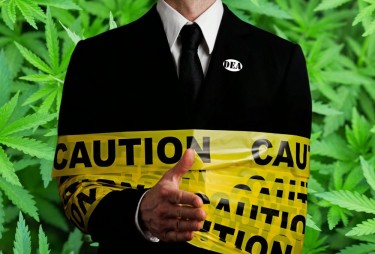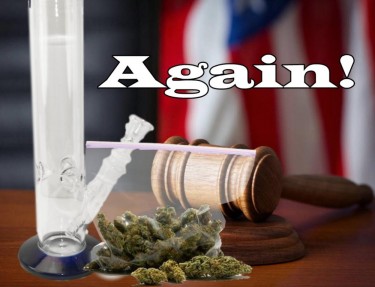
The Drug Enforcement Administration (DEA) is often portrayed in popular media as a valiant police force dedicated to combating drug cartels and keeping our streets safe from dangerous illegal substances. Images of fearless DEA agents conducting dramatic raids and busts fill movies and TV shows, shaping the public perception of this powerful government agency.
However, behind this carefully crafted facade lies a more troubling reality. The DEA functions as its own quasi-government, wielding immense power over the very definition of what constitutes an illicit drug. With its own appointed judges and largely unchecked authority, the DEA serves as the ultimate gatekeeper, determining which substances are deemed acceptable for medical research and which are consigned to the shadowy realm of criminality.
Under the DEA’s arbitrary scheduling system, cannabis remains firmly entrenched as a Schedule I drug, denoting “no accepted medical use and a high potential for abuse.” This classification persists despite a growing body of scientific evidence and countless patient testimonials attesting to the therapeutic potential of marijuana for a wide range of conditions. The DEA’s intransigence on this matter has created an absurd situation in which biotech companies, seeking to conduct legitimate research into the medical applications of cannabis, must navigate a byzantine bureaucratic process established by the very agency that stubbornly refuses to acknowledge the plant’s medicinal value.
Yet even for those intrepid companies willing to wade through the DEA’s regulatory morass, the path to researching this “highly dangerous drug” is fraught with inexplicable delays, opaque decision-making, and seemingly endless obstacles. The story we’ll be examining today lays bare the true nature and purpose of the DEA, an agency that appears more interested in perpetuating the failed War on Drugs than in facilitating scientific progress and medical advancement. As the evidence mounts and public opinion shifts, it becomes increasingly clear that it may be time to seriously reconsider the DEA’s role in our society and whether this unaccountable institution deserves to maintain its stranglehold over the future of medicine.
The case of MMJ BioPharma Cultivation Inc. versus the Drug Enforcement Administration (DEA) serves as a poignant example of the agency’s obstructive and counterproductive approach to medical research. MMJ BioPharma, a Rhode Island-based biotech pharmaceutical company, has been striving to develop cannabis-based medications that could potentially revolutionize the treatment of debilitating conditions such as multiple sclerosis and Huntington’s disease. These efforts align with the growing trend of cannabis-based pharmaceuticals, exemplified by the groundbreaking FDA-approved drug Epidiolex, which has provided hope and relief to countless patients suffering from severe epilepsy.
However, MMJ BioPharma’s noble pursuit of scientific advancement has been met with a series of inexplicable roadblocks and bureaucratic hurdles erected by the DEA. In 2018, the company dutifully applied for the necessary licenses to cultivate marijuana for research and development purposes, eagerly anticipating the opportunity to commence clinical trials that could yield life-changing treatments. Yet, despite meticulously following the DEA’s convoluted application process, MMJ BioPharma found itself trapped in a seemingly endless cycle of delays, obfuscation, and stonewalling.
The company’s lawsuit against the DEA paints a disturbing picture of an agency more concerned with maintaining its iron grip on drug prohibition than facilitating scientific progress. MMJ BioPharma alleges that the DEA repeatedly failed to meet statutory deadlines, neglected to submit the company’s application to the Federal Register within the required timeframe, and provided evasive or contradictory responses to inquiries regarding the status of their registration.
This pattern of behavior suggests a deliberate attempt to obstruct and discourage research into the therapeutic potential of cannabis, rather than a good-faith effort to regulate and oversee the process.
The DEA’s actions, or lack thereof, have not only hindered MMJ BioPharma’s ability to conduct vital research but have also had a profound impact on the lives of countless patients who could potentially benefit from the development of these innovative medications.
The agency’s intransigence has effectively condemned these individuals to continue suffering, denying them access to potentially life-altering treatments that could improve their quality of life and offer hope where traditional therapies have failed.
Moreover, the DEA’s apparent disregard for the scientific process and its lack of transparency in decision-making raise serious questions about the agency’s true motives.
Rather than acting as an impartial regulator guided by evidence and the public interest, the DEA seems to prioritize its role as a gatekeeper, jealously guarding its power to dictate which substances are deemed acceptable for medical use. This approach not only stifles innovation and hinders the advancement of medical science but also undermines the fundamental principles of a free and open society.
As MMJ BioPharma’s legal battle against the DEA unfolds, it serves as a microcosm of the broader struggle between those seeking to harness the therapeutic potential of cannabis and an entrenched bureaucracy intent on maintaining the status quo. The question that looms large is: if the DEA is the gatekeeper, who owns the manor? Who truly benefits from the agency’s intransigence, and what interests does it serve to keep the gates of medical progress so tightly shut?
The Drug Enforcement Administration (DEA) is often portrayed as a noble agency dedicated to protecting the American public from the scourge of illegal drugs. However, a deeper examination of the agency’s history and actions reveals a far more troubling reality. To fully understand the DEA’s true role, we must first delve into its origins and the legislative framework that granted it such sweeping powers.
Prior to the establishment of the Controlled Substances Act (CSA), the DEA was another agency run by the notorious Harry J. Anslinger, a man whose name is synonymous with the racist and xenophobic roots of drug prohibition. The CSA, signed into law by President Richard Nixon in 1970, codified a system that essentially granted the “official pharmaceutical industry” a monopoly over the production, distribution, and manufacture of “approved” drugs. Any substance falling outside this narrow definition would be deemed “contraband” and subject to severe criminal penalties.
Under this new regime, the DEA was tasked with two primary functions: serving as the enforcers of Big Pharma’s interests and acting as the gatekeeper to protect their monopoly. The agency was granted the power to determine the legal status of drugs, effectively deciding which substances would be allowed to generate profits for pharmaceutical companies and which would be relegated to the black market.
Additionally, the DEA was armed with guns and the authority to pursue and arrest those who dared to challenge this monopoly, ensuring that no competitors could threaten the dominance of the established players.
The case of MMJ BioPharma perfectly illustrates the DEA’s true priorities. This biotech pharmaceutical company is working tirelessly to develop a cannabis-based medicine that could potentially improve the lives of countless patients suffering from conditions such as multiple sclerosis and Huntington’s disease. However, their groundbreaking work threatens to disrupt the profits of certain pharmaceutical manufacturers who currently market drugs for these conditions.
Rather than embracing the potential for medical advancement, the DEA has instead thrown up countless bureaucratic roadblocks, burying MMJ BioPharma in a labyrinth of red tape and administrative hurdles designed to stifle innovation and protect the status quo.
This blatant obstruction of scientific progress lays bare the DEA’s true allegiance. Rather than prioritizing the health and well-being of the American people, the agency appears to be more concerned with safeguarding the interests of Big Pharma.
By denying companies like MMJ BioPharma the opportunity to research and develop potentially life-changing medications, the DEA is effectively denying patients access to safer, more effective treatments that could dramatically improve their quality of life.
It is becoming increasingly clear that the DEA’s role as a “protector” of public health is little more than a facade. Behind closed doors, the agency operates as an extension of the pharmaceutical industry, using its vast powers to maintain a monopoly that prioritizes profits over people.
As Americans continue to struggle with the devastating consequences of the opioid epidemic and the limitations of currently available treatments, it is time to question whether the DEA truly serves the interests of the public or merely acts as a guardian for the financial interests of a privileged few. Only by confronting this uncomfortable reality can we hope to reform a broken system and ensure that the well-being of patients, not the bottom line of pharmaceutical companies, is the driving force behind drug policy in the United States.
The case of MMJ BioPharma’s legal battle against the DEA serves as a stark reminder of the agency’s true nature and the insidious role it plays in perpetuating a broken system that prioritizes the interests of Big Pharma over the health and well-being of the American people. By erecting endless bureaucratic barriers and stonewalling efforts to research the therapeutic potential of cannabis, the DEA has revealed itself to be not a protector of public health, but rather a guardian of a monopolistic industry that profits from the suffering of patients.
The DEA’s actions, or more accurately, its inaction, in the face of promising scientific advancements raises serious questions about the agency’s legitimacy and its place in a society that prides itself on the principles of liberty and individual autonomy. If citizens are not free to make informed decisions about what substances they can put into their own bodies, then the very concept of personal freedom is rendered meaningless. When an unelected government agency has the power to dictate which medicines are acceptable and which are forbidden, it effectively asserts ownership over the bodies and health of the American people.
There is a word for a system in which individuals are denied control over their own bodies, where their physical autonomy is subjugated to the whims of those in power: slavery. While it may seem hyperbolic to invoke such a charged term, the reality is that the DEA’s actions amount to a form of medical slavery, denying patients the right to access potentially life-changing treatments and forcing them to rely on a limited range of often inadequate or dangerous pharmaceutical products.
In a truly free society, the DEA’s current form and function would be an anathema. It is time for Americans to demand an end to this tyrannical agency and the oppressive system it upholds. Only by dismantling the DEA and its stranglehold on medical research and personal choice can we hope to create a future in which the health and autonomy of individuals are respected, and the potential of science to alleviate suffering is fully realized. The sticky bottom line is that the DEA, as it exists today, is incompatible with the fundamental principles of liberty and justice. It is a relic of a failed War on Drugs, a monument to the corrupting influence of special interests, and a betrayal of the American people’s trust. The time has come to reclaim our bodies, our health, and our freedom from the clutches of this oppressive institution.
SUE THE DEA FOR WEED LAWS, READ ON…
DEA HIT WITH ANOTHER CANNABIS LEGALIZATION LAWSUIT!
- SEO Powered Content & PR Distribution. Get Amplified Today.
- PlatoData.Network Vertical Generative Ai. Empower Yourself. Access Here.
- PlatoAiStream. Web3 Intelligence. Knowledge Amplified. Access Here.
- PlatoESG. Carbon, CleanTech, Energy, Environment, Solar, Waste Management. Access Here.
- PlatoHealth. Biotech and Clinical Trials Intelligence. Access Here.
- Source: http://cannabis.net/blog/opinion/suing-the-dea-to-get-weed-legalized-how-the-dea-rigged-the-game-to-keep-cannabis-illegal-for-th




